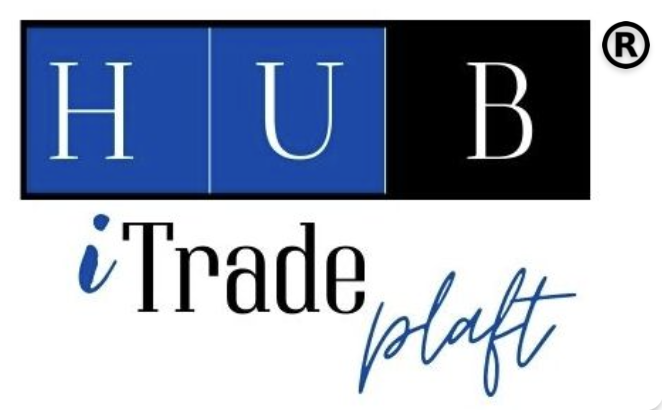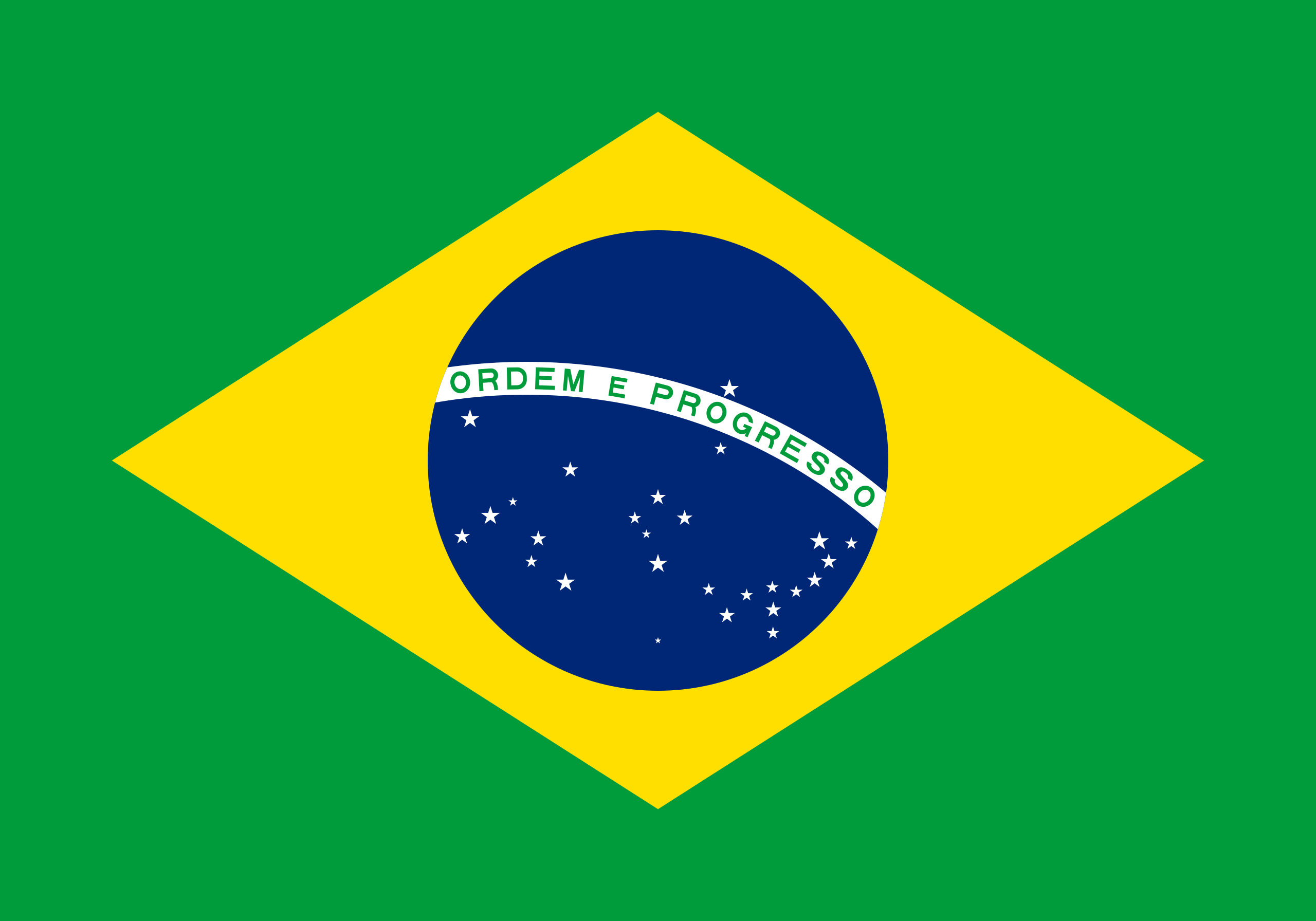Blockchain

In its free translation, blockchain means chain of blocks. It is a peer-
to-peer system, that is, it records the date and time and records all
transactions that took place in the end-to-end network.
Source: 1001 Blockchain | Pesquisa TI INSIDE sobre Blockchain no Brasil. 2a. ed. In livecoins.com.br/wp-content/uploads/2018/04/pesquisa_blockchain-Brasil.pdf. Acessado em 26/12/22, às 09:28.
On the blockchain, each block contains a file and a hash, which
ensures that the block’s information is not tampered with. In
addition, every block contains its hash and that of the previous
block, forming a connection between the blocks.

It is a specific type of publicly stored database, without central control, containing a chain of blocks ordered chronologically, whose information is stored using a cryptographic code, applied in various uses, in the form of a point-to-point network and which ensures immutability, transparency, decentralization, security, distributed records, consensus, liquidity and irreversibility of transactions.
Blockchain
Characteristics
CANNOT BE CORRUPTED
Each node on the network has a copy of the digital record. To complete a transition, each node needs to verify that it is valid. If the majority agrees that it is valid, then it is added to the record. This promotes transparency and corruption-proofing.
DECENTRALIZED TECHNOLOGY
The network is decentralized, which means that it has no governing authority, or only one person who has complete control. Thus, a group of nodes maintains the decentralized network.
IMPROVED SECURITY
Since the need for a central authority is eliminated, nothing can change any feature of the network for its own benefit. Encryption also provides another layer of security for these systems.
DISTRIBUTED RECORDS
Network logs are maintained by all other users of the system. This distributes the computational power across all computers so that there is a better and faster result.
CONSENSUS
Every Blockchain thrives due to consensus algorithms. The architecture is intelligently designed and consensus algorithms are at the core of this architecture. Each Blockchain has a type of consensus, to help the network make decisions.
FASTER AGREEMENTS
Blockchain offers faster settlements as compared to traditional banking systems. In this way, a user can transfer money relatively faster, facilitating and speeding up all transactions.
Source: 1001 Blockchain
Blockchain Technology will initiate the innovation of the Internet of Value, creating a new layer on top of the Internet, enabling transactions without the need for trust establishment between participants in international trade by a third party, and will reinforce the 4th Industrial Revolution, being a megatrend in adoption. of blockchain together bringing together resources such as cryptocurrencies, digital wallets, and smart contracts, allowing transactions of secure and immutable value, without the need for certain intermediary institutions, paving the way for the implementation of distributed ledger technology, reducing
transaction costs by up to 95%.
The international market is approximately U$16 trillion (US dollars) and represents the exchange of capital, goods, and services across borders or international territories. However, the trade and financing suffers mainly from a lack of trust and coordination between exporters and importers, especially in emerging and developed markets. Blockchain technology came to be implemented to overcome several problems of inefficiencies and operational costs, including fraud, delays, and loss of revenue and opportunities due to the operational complexity of the traditional management model of the entire international trade chain, which makes it difficult to exploit the potential of technological innovation.
Blockchain Statistics
HOW DO YOU DEFINE YOUR KNOWLEDGE ABOUT BLOCKCHAIN ?
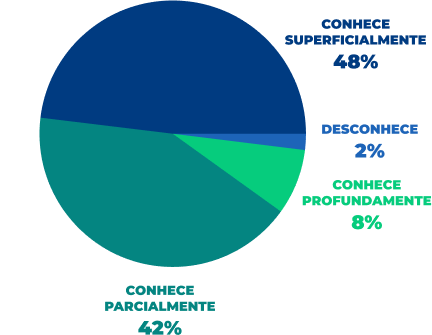
DO YOU WANT TO DEVELOP PROJECTS USING BLOCKCHAIN TECHNOLOGY?
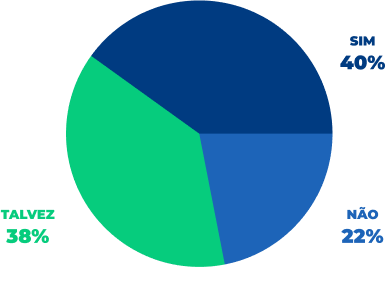
DO YOU KNOW THE ETHEREUM PLATFORM?

IF YES, HOW LONG?
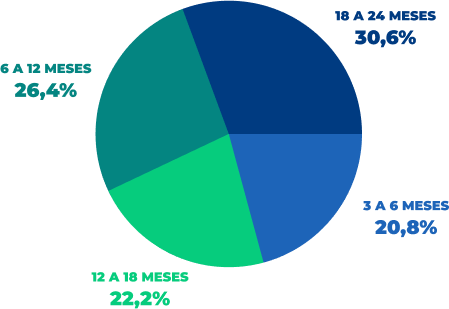
Source: 1001 Blockchain | Pesquisa TI INSIDE sobre Blockchain no Brasil. 2a. ed. In livecoins.com.br/wp-content/uploads/2018/04/pesquisa_blockchain-Brasil.pdf. Acessado em 26/12/22, às 09:28.
THERE ARE SEVERAL APPLICATIONS WHERE BLOCKCHAIN PLATFORMS
ARE BEING USED PRIORLY IN THE SEGMENTS LISTED BELOW,
WHICH DO YOU KNOW THAT USE THESE APPLICATIONS?
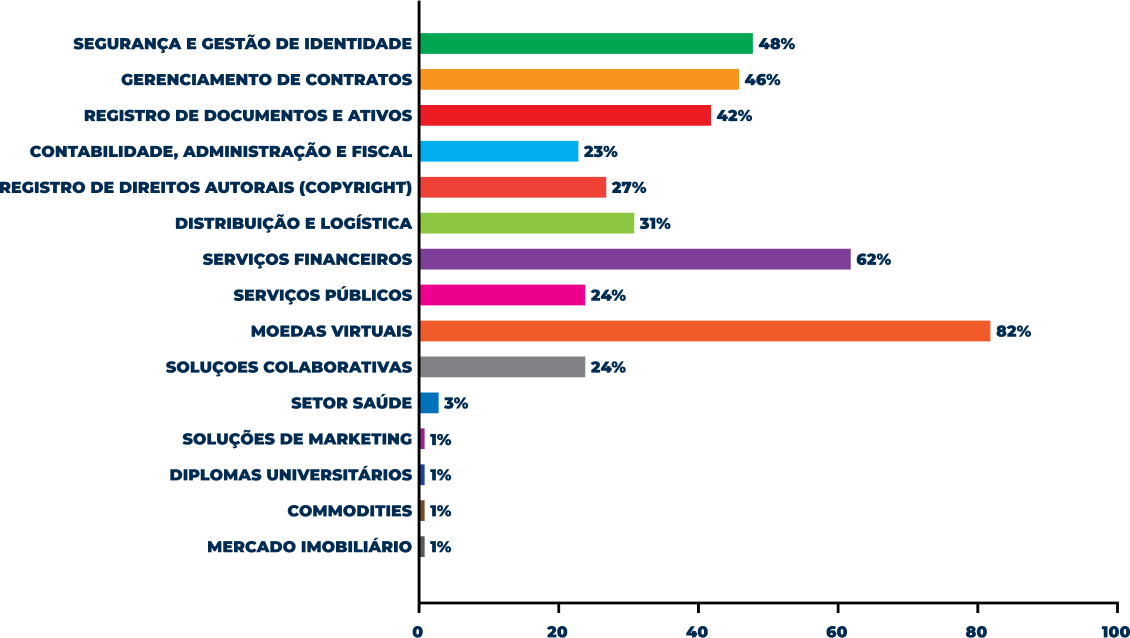
Source: 1001 Blockchain | Pesquisa TI INSIDE sobre Blockchain no Brasil. 2a. ed. In livecoins.com.br/wp-content/uploads/2018/04/pesquisa_blockchain-Brasil.pdf. Acessado em 26/12/22, às 09:28.
Blockchain in Brazil and the General Data Protection Law - GDPL
Brazil already has the regulation and legal authorization for the use and application of Blockchain in Foreign Trade since 2020, when Decree No. 10,550 of 11/26/2020 was published. The decree itself benefited the Federal Revenue Service of Brazil, which had contracted SERPRO – Federal Data Processing Service to create the bConnect network used to guarantee the authenticity of customs information shared within MERCOSUR. With the publication of this Decree, Brazil becomes a pioneer in the use of blockchain technology for the documentation validation process in foreign trade processes.
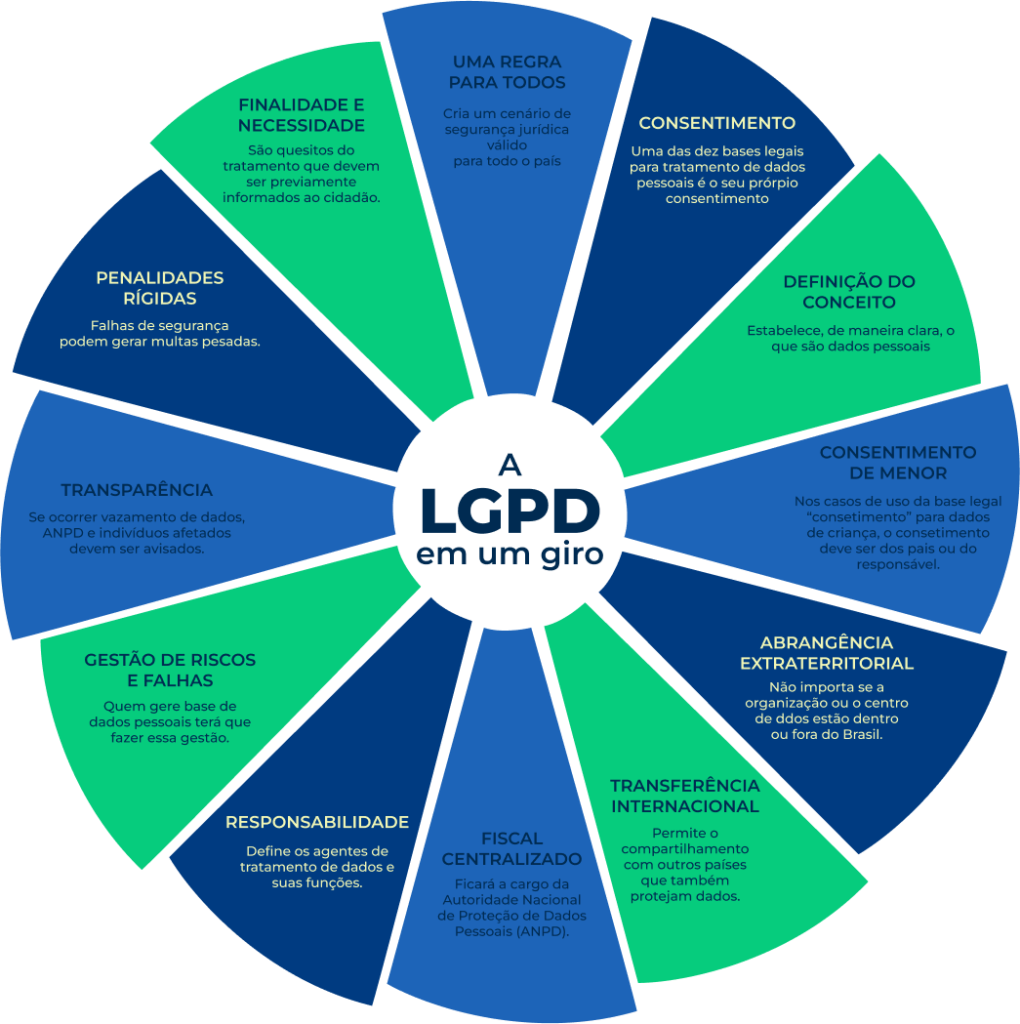
General Data Protection Law-GDPL, Law No. 13,709, approved in Brazil in August 2018 and in force since August 2020, created a scenario of legal certainty, with the standardization of norms and practices to promote protection, equally and within the country and in the world, to the personal data of every citizen who is in Brazil. And, so that there is no confusion, the law defines which data are subject to even more specific care, such as sensitive data and data about children and adolescents, and which data, processed both in physical and digital media, are subject to regulation. The LGPD still establishes that it does not matter whether the headquarters of an organization or its data center is located in Brazil or abroad: if there is the processing of content from people, Brazilian or not, who are in the national territory, the GDPL must be complied with. It also determines that it is allowed to share data with international organizations and with other countries, as long as this occurs based on secure protocols and/or to comply with legal requirements.
It is also based on the following legislation:
Legal framework for Startups: Complementary Law No. 182, of June 1, 2021.
Legal framework for Cryptocurrencies: Bill No. 4401 of 2021 approved by the Federal Senate.
Blockchain legal framework in Brazilian Foreign Trade: Decree No. 10550, of November 24, 2020.
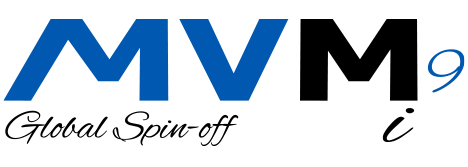
MVMi9 is a Scalable Startup of the B2B-Business to Business type, considered a Spin-off, derived from the creation of a new company
anchored in the expertise of almost 3 decades in International Trade Consulting carried out by MVM Soluções Corporativas. On the initiative of CEO and founder José Ramos da Silveira.
MVMi9 is focused on the development of corporate technological solutions, initially offering as a Logtech startup two solutions in the supply chain built under the models BPaaS-Business Process as a Service (Plataforma iT Chain PlatformBh) and PaaS-Partner as a Service (iT Chain Experts Dapp) for the international trade of goods, goods, and services, focusing on importers and exporters, the protagonists of the chain, and in line with risk management in accordance with the PMBOK Guide version 7. Not only does the expertise in International Trade Consulting stands out, but in particular the 12 years of experience in the various Conformity Assessment mechanisms, in particular the Certification of Products due to acting as an OCP-Product Certification Body in that period.
Business rule team

José Ramos
MVM CEO and founder
• Specialist in International Trade
• 30 years as an International Trade Consultant
• 12 years of Expertise in Product Certification – Brazilian conformity
assessment system-BCAS
• Author of the book “Avaliação da Conformidade: Ferramenta Estratégica no Comércio internacional”
• Customs Broker 4D.0.150
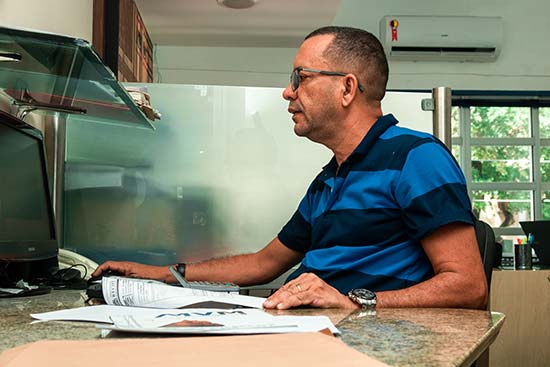
Denilson Andrade Silva
FOREIGN TRADE ANALYST
• 15 years as a Foreign Trade Analyst
• Customs Broker 4D.0.280

Edson Souza
FOREIGN TRADE TECHNOLOGIST
• Foreign trade analyst
• Technologist in Foreign Trade
• 20 years of Expertise in Foreign Trade
• Customs Broker 4D.0.130

Alexandre M. de Albuquerque
Head of sales
• 37 years of commercial expertise
• Worked in large companies such as BRADESCO Bank, PIRELLI Tires and MAGNUM Tires
• Development of new markets and customers, sales strategy, development of new business niches and commercial team management
The Problem
Centralized International Trade System, Digital Platforms with difficulty in interfacing with other IT systems and lack of humanized support.
International Trade Chain Management in the traditional model generates high costs, takes more time, and presents inaccurate data, errors, and lack of confidence due to the fact that it is highly centralized. In public Blockchain solutions (non-permissioned), in turn, there are no entry limitations, participation in the network is open, and anyone can verify and audit transactions executed in real-time, but no personal data or names of those involved are mentioned, as the authors of these transactions are not identified, with the characteristic of anonymity. On the other hand, Usage rules, Responsibility Matrix, and Punishment Criteria in private (permissioned) networks are not enough, just as it is not enough to have unique, immutable records with a remote possibility of falsification or manipulation of platform data, ensuring that processes will be finely documented and executed, while the customer is aware of the origin of the product or service received. In addition to the problems mentioned above:
• Lack of international trade document standards for use in the digital world, given that only 1.2% of these are digitalized according to ICC/WTO;
• Legal uncertainty in the acceptance of international trade documentation in the digital world;
• Platforms with different Rule Books, which hinder or delegitimize documents transacted within the scope of digital international trade;
• Platforms with ineffective interface standards between blockchain networks and public/state bodies controlling international digital trade;
• Platforms with no knowledge, even little mastery, of the processes that cover the conformity assessment requirements of products subject to compulsory
certification;
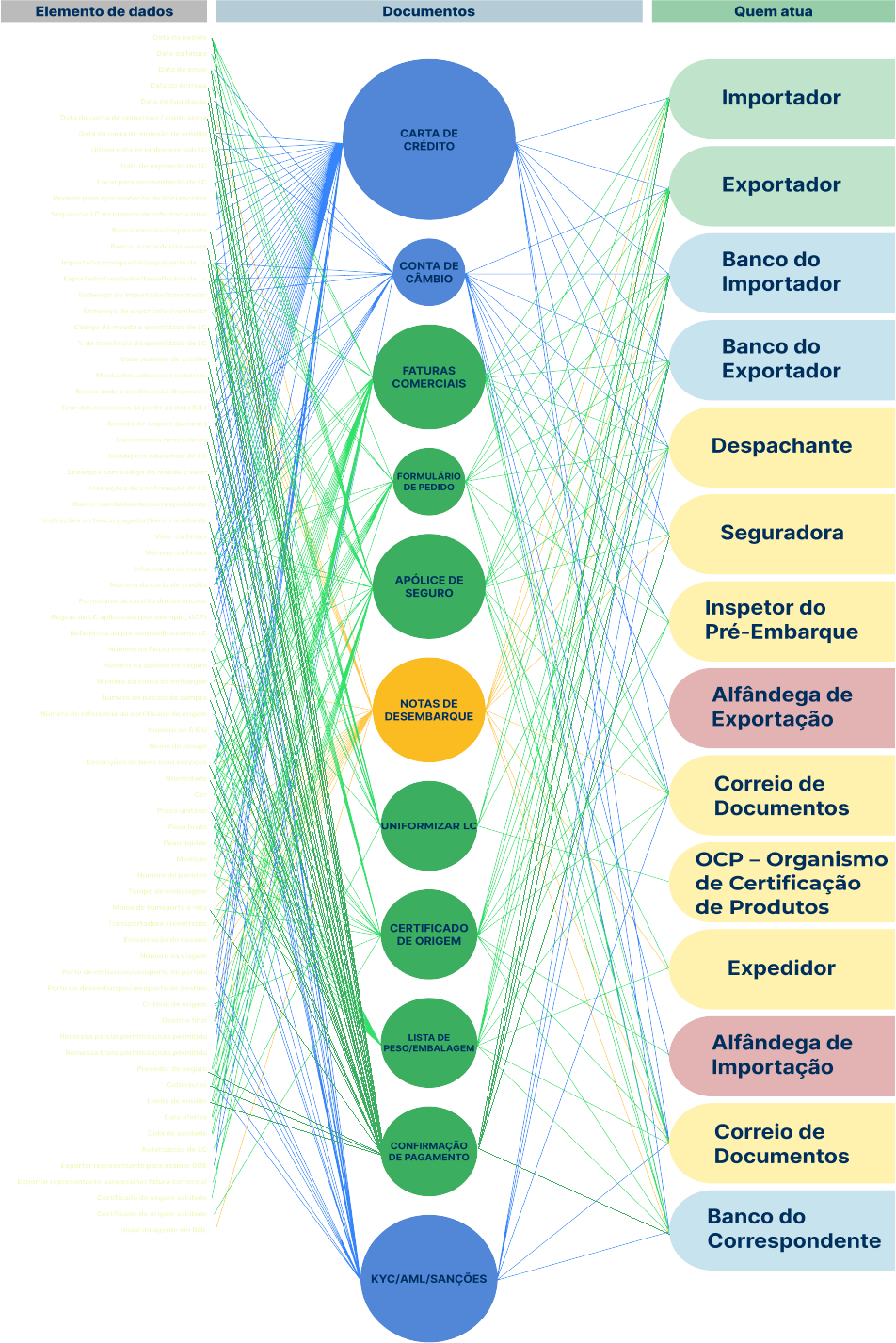
Source: 1001 Blockchain Adaptado
The Solution

Customizable Hybrid Blockchain International Trade Platform, with controlled access and freedom at the same time, but maintaining blockchain features such as integrity, transparency, and security, which solves a serious problem of distrust on the part of regulatory government bodies and trade consenting parties in regarding access/adhesions. The iTChainPlatformBh adopts the BPaaS-Business Process as a Service model as a true partner of the protagonists of the International Trade chain (Importers/Exporters), ensuring that users can work with their stakeholders, with the advantage of even this terrestrial model. If limited anonymity for users participating in the network, public anonymity is still maintained, offering all the critical features of a public blockchain such as security, transparency, immutability, and decentralization.

Computer application in a decentralized peer-to-peer, open-source network, bringing together experts in International Trade and the like in order to offer users advisory and independent support, in harmonious coexistence with the iT Chain PlatformBh Platform, regardless of central authority, with its system not subject to failures because it is stored in the cloud. By adopting the PaaS-Partner as a Service model, the iT Chain Experts Dapp operates, in symbiosis
with the iT Chain PlatformBh Platform, making communication between experts and users with the aim of providing the redistribution of value produced on the Platforms.
Standing Out from the Competition
The solution to the problem comes from making available, on the market, the hybrid blockchain platform iTChainPlatformBh and humanized support through the decentralized app iT Chain Experts Dapp, which brings specialists and users together, combined with differentials developed by experts with 30 years in International Trade, and not only by technologists and/or logisticians, and for mastering Conformity Assessment Mechanisms, notably Product Certification, with 12 years of experience as OCP-Product Certification Body in the BSCA-Brazilian System of Conformity Assessment.
Our Platform establishes and offers a network that covers all Product Certification stages in an automated and digital way, contributing differentially to the significant reduction of costs and time in a process that, in practice, takes about 2 months or more and that can be done in a few weeks, within the compulsory scope of Product Certification that is part of International Trade and forgotten by competitors’ solutions.
The list of competitive advantages of our solution is made up of the fact that the iT Chain PlatformBh Platform brings together maritime, land, and air modal actors and is not just focused on maritime transport often derived from alliances such as those of the Joint Ventures type, which culminate inevitably in conflict of interests.

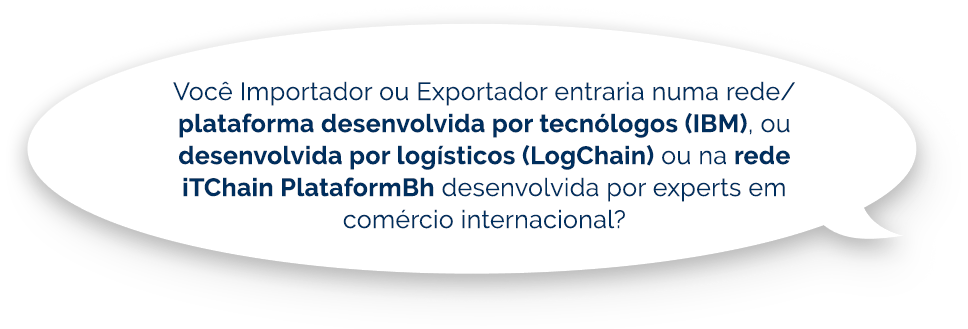

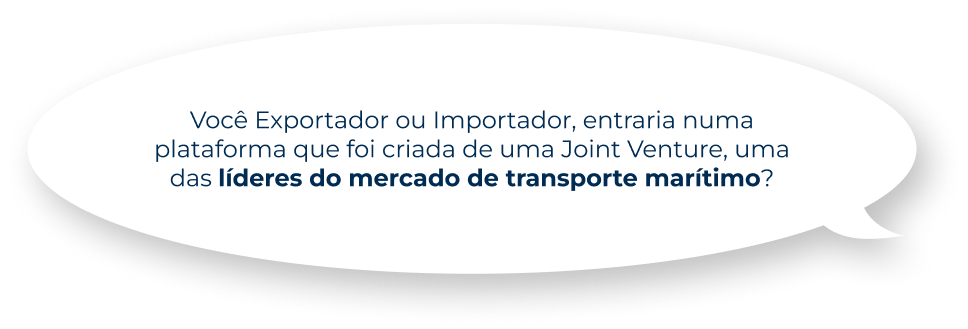
Known Competitors

Business Opportunity
“Brazil is the Latin America’s gateway to the blockchain.”
“Blockchain is the next game changer in International Trade according to the Word Trade Organization – WTO.”
“A new opportunity for countries in Latin America and the Caribean by leveraging blockchain technology linked to International Trade.”
“The Blockchainat market by 2026 will grow at an annual rate of 68,4%, from U$ 4,9 billion in 2021 to U$ 67,4 billion and will increase global GPD by U$ 1,76 trillion by 2030.”
Looking for Investors
The Startup Lifecycle

Maturity
Typical increase
Source: ClearHouse Accountants
Timeline
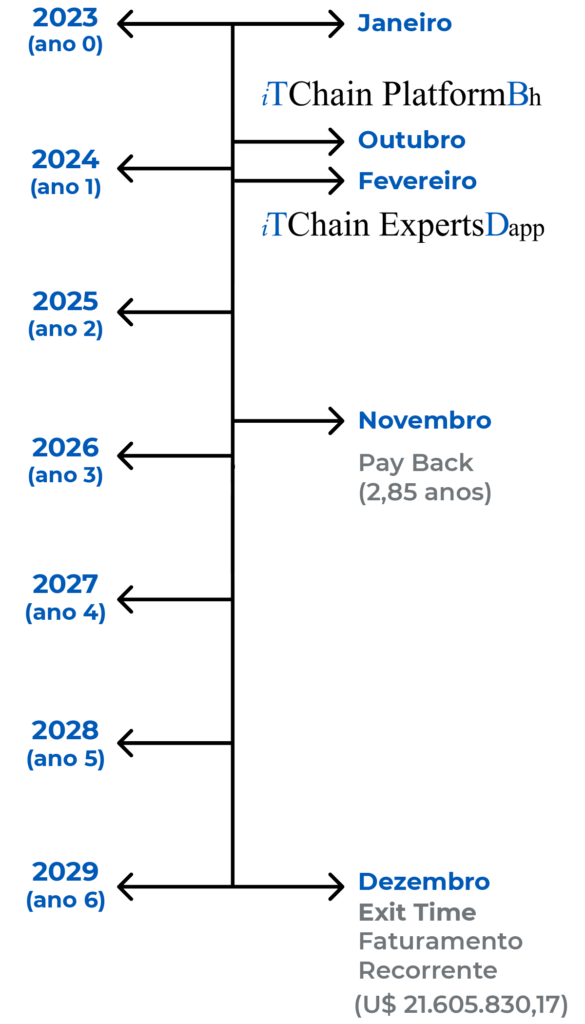
The iTChainPlatformBh Platform and the iT Chain Experts Dapp decentralized App together have a projected annual recurring gross revenue of U$21,605,830.17 in year 6 of operation according to our CANVAS business model. We are looking for an investment worth US$ 1,385,953.69 offering a return of 5.82 times the amount invested, which corresponds to an ROI6.5 of 30%, that is, US$ 8,066,164.68 considering a 6.5-year stay at the startup with a Valuation equal to U$ 13,859,536.90. Optionally, the investor may acquire 10% of the company’s shares in exchange for the amount invested in the startup

